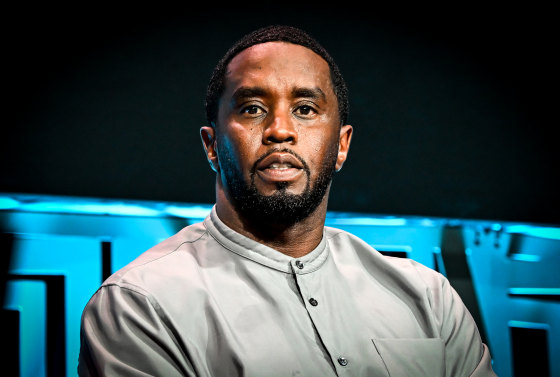This is a free newsletter for Diddy on Trial newsletter subscribers. Sign up to get exclusive reporting and analysis throughout the trial.
We’re now 17 days away from the start of jury selection in Diddy’s criminal trial, when this newsletter will take you inside a federal courtroom in downtown Manhattan with exclusive access to one of the biggest celebrity trials in memory. If you have any questions, drop us a line at diddyontrial@nbcuni.com. We may feature your query in a future edition.
In today’s edition of Diddy on Trial, I break down the charges against the hip-hop mogul. Plus, we take a question from one of our readers. But first, here’s a look at some key developments in the case.
- Judge Arun Subramanian denied a request by Diddy’s lawyer to delay the trial for two months at a two-hour hearing today. Adam Reiss, who was in the courtroom, told us Diddy seemed “solemn and anxious.” When the hearing ended, court officers allowed Diddy to turn his chair and face his mother in the gallery. “I love you,” he told her. “Everything will be alright.” There’s another hearing next week.
- Diddy pleaded not guilty Monday to two new counts of sex trafficking and transportation to engage in prostitution.
- Diddy’s lawyers are asking the judge to let prospective jurors be questioned in writing about their opinions on sex, drugs and violence. But prosecutors don’t like that proposal. They’d like questions on those topics to be asked in person by the judge. Janelle Griffith has details.
- Brian Steel, an attorney who represented rapper Young Thug in Georgia’s longest-running criminal trial, joined Diddy’s legal team.
- The jury instructions gave us a more precise idea of the timetable for the trial. It’s expected to last about eight to 10 weeks. It’ll be held five days a week, Monday through Friday. The first week of the trial will run from 9:30 a.m. to 5 p.m. ET; after that, it’ll go from 9:30 a.m. until 3 p.m. ET.
Was this newsletter forwarded to you? Sign up here.
Mailbag
We heard from a reader named Stacey Rice, who wanted to know whether the trial will be broadcast live on television. The short answer: no.
In general, cameras are not allowed in federal criminal cases. Rule 53 of the Federal Rules of Criminal Procedure says in part that “the court must not permit the taking of photographs in the courtroom during judicial proceedings or the broadcasting of judicial proceedings from the courtroom.”
But one of the goals of this newsletter is to get you closer to the action. In most editions, reporter/producer Adam Reiss will provide reports on the scene inside 500 Pearl St. — including how Diddy seems to react to the most pivotal testimony.
What to know about the charges against Diddy
By Daniel Arkin
On Sept. 17, Diddy was plunged deeper into legal jeopardy.
That’s the date when federal prosecutors unsealed a sweeping indictment against the hip-hop impresario. In the 14-page document, the government painted a damning portrait of a powerful celebrity who allegedly “abused, threatened and coerced women and others around him to fulfill his sexual desires, protect his reputation, and conceal his conduct.”
“Combs relied on the employees, resources, and influence of the multi-faceted business empire that he led and controlled—creating a criminal enterprise whose members and associates engaged in, and attempted to engage in, among other crimes, sex trafficking, forced labor, kidnapping, arson, bribery, and obstruction of justice,” prosecutors alleged.
In the seven months since the first wave of criminal counts were unsealed and the embattled mogul pleaded not guilty, prosecutors have updated the indictment three separate times. Diddy has pleaded not guilty to all the charges and denied wrongdoing. Here’s a short guide to the charges — and prison sentences Diddy faces if he’s convicted.
The indictment
The original indictment filed by prosecutors with the Southern District of New York contains three charges:
racketeering conspiracy, which carries a maximum sentence of life in prison;
sex trafficking by force, fraud or coercion, which carries a maximum sentence of life in prison and a mandatory minimum sentence of 15 years in prison;
and transportation to engage in prostitution, which carries a maximum sentence of 10 years in prison.
The indictment refers to a Victim-1, whose accusations closely mirror those of R&B singer Cassie, Diddy’s ex-girlfriend. She filed a civil lawsuit against him in November 2023, which they settled within a day but laid the groundwork for a federal investigation.
The first superseding indictment
In a 15-page document filed Jan. 30, prosecutors expanded the timeline of Diddy’s alleged racketeering conspiracy, placing it from around 2004 to 2024. They also added two new sex trafficking victims, identified as Victim-2 and Victim-3, and accused Diddy of dangling someone over an apartment balcony. But no new charges were leveled against him.
The second superseding indictment
In a 15-page document filed March 6, prosecutors added more detail to their portrait of Diddy as the mastermind of an alleged criminal conspiracy, accusing him of forcing employees to work long hours with little sleep and wielding threats to get them to comply with his demands.
The second superseding indictment also didn’t contain new charges.
The third superseding indictment
In the latest updated indictment, filed April 3, prosecutors added two more charges of sex trafficking and transportation to engage in prostitution — bringing the total number of criminal counts against Diddy to five.
Prosecutors have shielded the identities of all the alleged victims at the center of the case.

